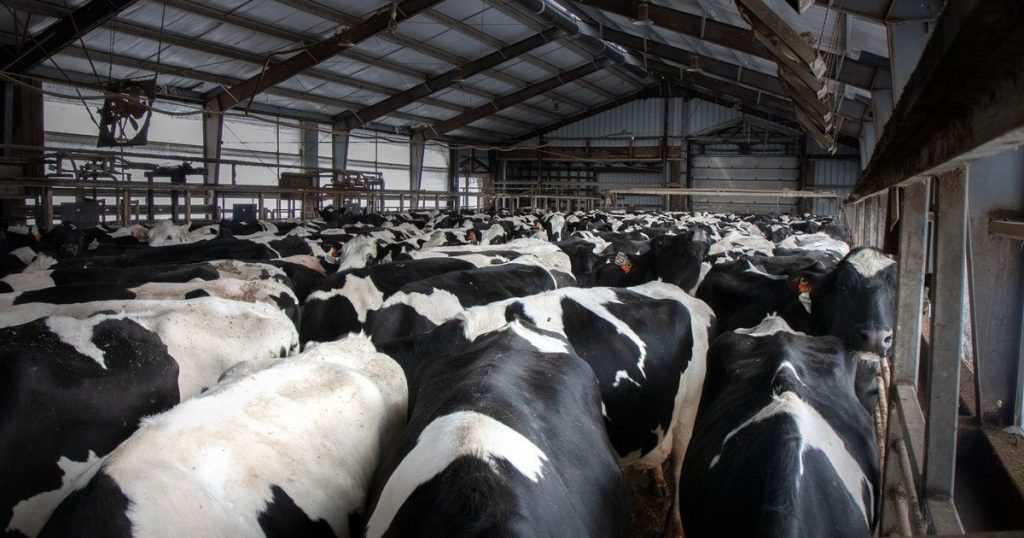
The five-member Winona County Coordinating Committee in southeastern Minnesota voted 2 to 2 on Thursday to reject the difference request, which is the same number of votes that make up the denial. The chairman of the board resigned because he spoke against the project before joining the board.
Voting is a big blow to Lewiston’s daily farm. Winona County’s family-owned dairy business has fought for years to expand in the integration of the industry with a small number of large farms. The conflict ended in court and embodies the deep tensions in farmland over the growth of large-scale agriculture, and opponents say this practice is too harmful to rural areas and the environment.
Ben Daley, who spoke at the meeting on Thursday, wasn’t immediately asked for comment. He told the board that dairy farmers are competing in the global commodity market, and the differences allow milking operations to “continue for the next generation.”
Daleys sought differences to expand to 5,968 animal units (approximately 3,901 dairy cows and 525 heifers). This is significantly higher than the county’s limit of 1,500 animal units per feedlot.
Family lawyer Matthew Berger told the board that herd size caps are having a negative impact on the county’s agricultural economy. The upper limit was established in 1998. The number of dairy farms in the county decreased from 378 in 1997 to 160 in 2017. He said.
He also said the Minnesota Pollution Control Bureau has determined that the expansion of the daily farm has no potential for significant environmental impact.
Citizens concerned about the size of dairy products and their impact on the environment and the health of the surrounding rural communities were not allowed to speak at the conference.
In southeastern Minnesota, the karst terrain of the region raises concerns about large feedlots in particular. Abnormally porous rocks make it easier for animal manure applied to fertilizer fields to contaminate groundwater and wells with nitrates. Nitrate is toxic and even deadly to babies, and the area generally has high nitrate levels.
The county is located in Minnesota and has caps on feedlot animal units, but most limits tend to be around 2,000 to 3,000 animal units.
Board member Elizabeth Heublein said during the meeting that she voted to reject the daily farm’s request, primarily due to water quality concerns. She said the local aquifers and many local drinking wells were already contaminated with nitrates and could not justify admitting an exception that would increase the load. She said people need to think more deeply about what revenue means.
“We are always thinking about what it will cost and what we will make,” she said. “It’s time to look back and move towards three revenues instead of one. It’s our community, our ecology, and our economics.”
Heublein and another director, Kelsey Fitzgerald, who voted against the difference, showed during the meeting that they were in favor of a land management project. A Minnesota nonprofit advocates sustainable land use and has an office in Lewiston. Fitzgerald said she was a member.
Paul Louvers, a lawyer representing Winona County in a proceeding with the Daily family, said he was not surprised that the request for difference failed.
“They want almost four times the caps of animal units in the county. They’re essentially trying to rewrite the ordinance,” Rubers said.
Reuvers said he hopes Daleys will appeal and that the issue will return to the Winona County District Court because of the already published court files.
Tim Ahrens, a printing business near Altura in Winona County, helped organize a recent petition campaign to show support for the county’s existing feedlot restrictions. They have collected over 165 signatures. He said the refusal was the right decision, but the tie surprised him because the cap of the animal unit was a “pretty clear rule”.
“I wish it was some sort of closure and could promote cooperation on a food system that would serve everyone,” he said.
This is the second time Daley’s decentralized application has failed.
The Coordinating Committee also rejected the request in 2019, and the Dailys sued Winona County. The family blamed the prejudice committee because some of the members belonged to a land management project.
The district court judge agreed that the board’s decision was prejudiced. The family then sought a Court of Appeals decision deciding to make the difference, which stated that Daleys’ request had to be returned to the Coordinating Committee for review. The composition of the committee has changed since 2019.
Arlence said he hoped Thursday’s second refusal would result in some closure.
“I hope it’s closed, we’ll see,” he said.























